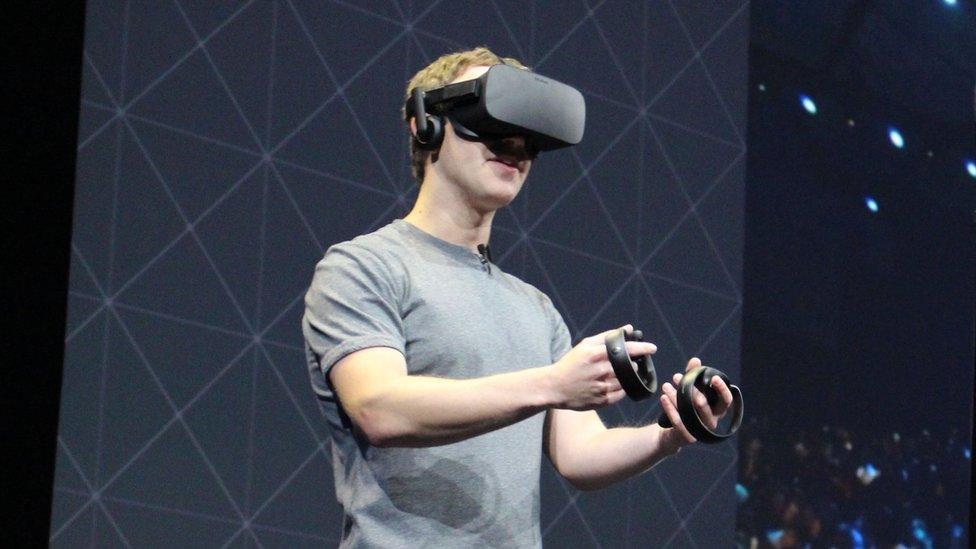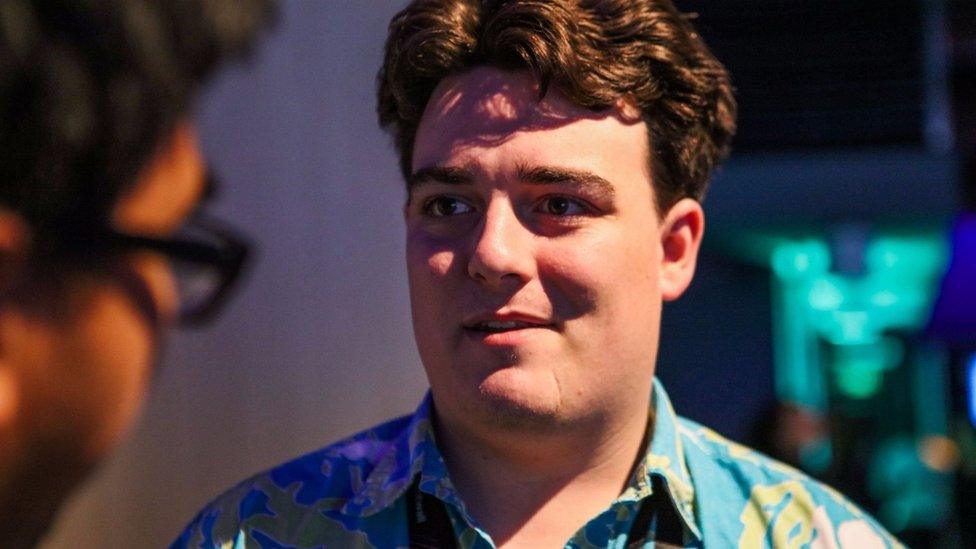Facebook's Mark Zuckerberg due in court over VR 'heist'
- Published

The Facebook founder has shown great enthusiasm for VR since his firm took over Oculus
Mark Zuckerberg is expected to appear in a Dallas court on Tuesday to defend his company over claims it stole virtual reality technology.
Zenimax Media, owner of renowned games studio id Software, is suing Facebook for $2bn (£1.6bn).
Zenimax argued its early innovations in VR were unlawfully copied when Oculus built its own headset, the Rift.
Oculus was bought by Facebook in 2014, and is seen as a major part of the firm’s strategy over the next 10 years.
The BBC understands Mr Zuckerberg will argue that Zenimax was slow to appreciate the potential of VR - and that it was Oculus’ own work that made it the valuable technology it is today.
"We're eager to present our case in court,” a spokesman for Oculus told the BBC.
"Oculus and its founders have invested a wealth of time and money in VR because we believe it can fundamentally transform the way people interact and communicate.
"We're disappointed that another company is using wasteful litigation to attempt to take credit for technology that it did not have the vision, expertise, or patience to build.”
Carmack
The row revolves around John Carmack, the legendary games designer famed for titles such as Doom and Quake. The company he co-founded, id Software, is owned by Zenimax.
For a short time, Mr Carmack was working for both id and Oculus - but in November 2013 he left id completely.

John Carmack is accused of taking intellectual property with him after he left id Software
"When it became clear that I wasn't going to have the opportunity to do any work on VR while at id Software, I decided to not renew my contract,” he told USA Today in 2014.
Zenimax now alleges that Mr Carmack shared intellectual property with Oculus while he was still working at id Software, and that when he left the company, he took that work with him.
According to court papers: "Carmack secretly and illegally copied thousands of documents containing ZeniMax's intellectual property from his computer at ZeniMax to a USB storage device which he wrongfully took with him to Oculus."
Speaking at the trial, which began last week, Zenimax lawyer Tony Sammi said it amounted to "one of the biggest technology heists ever”.
But lawyers for Mr Carmack characterised it differently, arguing that his contract explicitly allowed him to work with other companies that did not compete with Zenimax.
They argued that the "trade secrets" Zenimax claimed to have lost were in fact "the fruits of Mr. Carmack's participation and involvement with Palmer Luckey and Oculus", and therefore did not belong to Zenimax.
Missed the boat
Facebook’s defence is that Zenimax had its chance to invest in VR but chose not to - giving Oculus no option other than to seek outside investment.
The social media giant is arguing that Zenimax only showed significant interest in virtual reality after its $2bn acquisition was made public.

Oculus co-founder Palmer Luckey has not appeared in public since revelations he was funding a pro-Trump online campaign
Also crucial to the case is Palmer Luckey. Mr Luckey - who hasn’t been seen in public since revelations he was funding an online trolling campaign in support of Donald Trump, external - is expected to be called to the stand at some point this week.
In court papers Zenimax paints Mr Luckey as a “gaming enthusiast” whose Oculus Rift headset, which was initially funded via Kickstarter, was a crude prototype.
Mr Luckey, Zenimax said, lacked "the necessary expertise and technical know-how to create a viable virtual reality headset”, and therefore relied on Zenimax to help him create the prototype which impressed Facebook.
Mark Zuckerberg’s appearance is expected to last most of the day on Tuesday.
On Monday, the 32-year-old posted about meeting with local communities and law enforcement groups in Dallas as part of his new year pledge to travel to 30 different US states in 2017.
Follow Dave Lee on Twitter @DaveLeeBBC, external and on Facebook, external
- Published6 October 2016
- Published1 March 2016
